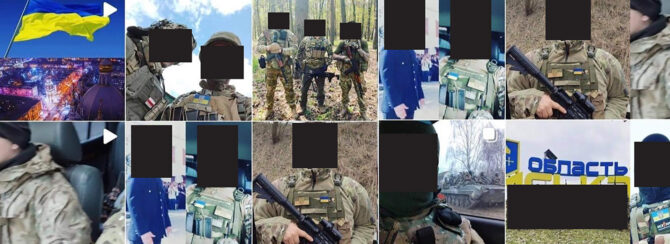The Greeks fighting in Ukraine

“These days have been difficult. We’ll see…” read the message I received on Signal after an interview request on May 13.
As Russian soldiers in the mostly occupied Zaporizhzhia region draw up “lists of leading local figures to be kidnapped” and search for journalists in order to make them collaborate or to silence them, Reporters Without Borders (RSF) reminds the Russian authorities that targeting journalists is a war crime.
The Zaporizhzhia-based news website 061.ua yesterday received its 12th threatening email from a Russian source since the start of the invasion, this one in the form of a children’s fairy-tale about a journalist with a Nazi father.
The preceding one, on 17 April, was very specific: “All journalists will be held responsible for spreading false information about Russia and spreading the Ukrainian Nazi regime’s propaganda […] A military tribunal will be set up for all those who support the Nazi regime led by [Ukrainian President] Zelenskiy.”
061.ua is based in the city of Zaporizhzhia itself, one of the few places in the Zaporizhzhia region that is not occupied. Another independent media outlet, Inform.zp.ua, is receiving similar messages. These news sites are also being subjected to DDOS attacks, in which sites are deliberately swamped with a flood of connection requests in order to block them.
In other cities and towns in the region – Melitopol, Berdiansk, Enerhodar and Tokmak – journalists have received “visits” from Russian soldiers, they have been subjected to interrogations and searches, their equipment has been seized, and in some cases have been taken hostage.
If they refuse to cooperate, their media outlets are forcibly closed or they may even be abducted. That is what happened to Irina Dubchenko, a journalist working for the UNIAN news agency and the Subota-plus weekly newspaper. She was abducted in Donetsk, in the Donbas region, on 26 March and was not released until 11 April.
According to Natalia Vyhovska, the Zaporizhzhia region representative of RSF’s local partner, the Institute of Mass Information (IMI), “the occupiers have lists of journalists and activists who they are watching.”
When a large number of journalists were simultaneously taken hostage in Berdiansk on 8 March, Serhii Starushko, a journalist with the PRO-100 media group, saw soldiers interrogate colleagues to get the names of other journalists and note them down on a list. The soldiers can then get the addresses of their homes from the local government databases they control in the occupied territories.
The use of such methods to track down journalists and others has also been reported by several foreign reporters and by the head of the Zaporizhzhia regional military administration, Oleksandr Starukh.
“By waging this manhunt to track down Ukrainian journalists, the Russian troops aim to terrorise them and force them to remain silent if they refuse to disseminate Kremlin propaganda,” said Jeanne Cavelier, the head of RSF’s Eastern Europe and Central Asia desk. “We remind the Russian authorities that targeting journalists is a war crime.”
RIA-Melitopol news website editor Svitlana Zalizetska used a false identity to leave Melitopol and avoid being snared by these “lists of leading local figures to be kidnapped.” On 23 March, shortly after her departure, her home in Melitopol was searched by two Russian soldiers and a Russian civilian, who took her ailing, 75-year-old father hostage and said he would be released only if she came to them.
Two days later, they agreed to free him in return for her transferring control of the website to certain third parties. But Zalizetska continues to be harassed by phone, email and social media and to receive threats that are identical to those received by the Zaporizhzhia-based websites 061.ua and Inform.zp.ua.
“The town is small and someone pointed it out,” said Vitaly Golod, the editor of the local newspaper Nashe Misto-Tokmak, referring to his home in the town of Tokmak. On 22 March, just two days after he left for the capital, Kyiv, his home was searched by Russian intelligence officers, who took documents and a digital data storage device.
Industrialne Zaporizhzhia correspondent Kateryna Danilina-Levochko had also already left Melitopol when Russian soldiers went to arrest her on 21 March at her parents’ home, which was her registered address. They asked about her activities and about Mikhailo Kumok, the owner of the Melitopolskie Vedomosti (MV)media group, for whom she had worked in the past.
Kumok, Evgenia Borian, the editor of Melitopolskie Vedomostinewspaper, and two of the newspaper’s journalists, Yulia Olkhovskaia and Liubov Chaika, were all arrested at their homes the same day and were held for several hours. The media group’s activities were then suspended and its printing press was closed. The Russian occupiers published a fake issue of the newspaper, full of propaganda, on 7 April.
All the print media outlets in Melitopol, Berdiansk, Enerhodar and Tokmak have stopped appearing because their staff refused to cooperate with the Russian occupiers. At the start of March, the Russian army cut off the broadcasting of Ukrainian TV channels in these four cities.
Ukraine is ranked 97th out of 180 countries in RSF’s 2021 World Press Freedom Index. Russia is ranked 150th.
This article is a reproduction of the original article that can be found here.

